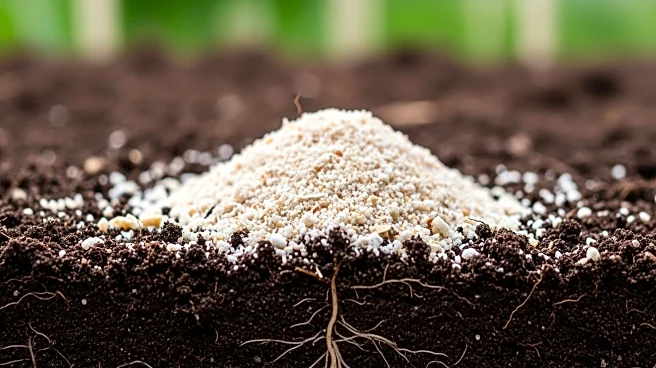What's Happening?
Recent research has demonstrated that crab shell meal (CSM) can effectively control root-knot nematodes through shifts in soil microbial communities and enhanced nitrification. The study involved pot experiments
using cucumber plants infected with Meloidogyne incognita, a common root-knot nematode. Researchers applied varying concentrations of CSM to the soil and observed its impact on nematode control and plant growth. The study found that CSM applications up to 4% significantly inhibited nematode activity without adversely affecting plant growth. The research also highlighted the role of Streptomyces eurythermus Cu4, a bacterium that showed antagonistic activity against the nematodes, further enhancing the effectiveness of CSM. The findings suggest that CSM could be a sustainable agricultural byproduct for managing nematode infestations, potentially reducing reliance on chemical pesticides.
Why It's Important?
The discovery of crab shell meal as a natural nematode control method is significant for sustainable agriculture. Root-knot nematodes are a major pest affecting various crops, leading to substantial economic losses. Traditional chemical treatments can be harmful to the environment and human health. By utilizing CSM, farmers can reduce chemical usage, promoting eco-friendly farming practices. This approach not only benefits the environment but also supports the agricultural industry by providing a cost-effective and efficient pest management solution. The research underscores the importance of exploring natural alternatives in pest control, which could lead to broader adoption of sustainable practices in agriculture.
What's Next?
Further research and field trials are likely to be conducted to validate the effectiveness of crab shell meal in different soil types and climatic conditions. Agricultural stakeholders may explore the commercial production and distribution of CSM as a pest control product. Additionally, regulatory bodies might consider approving CSM for widespread agricultural use, given its potential benefits. The study could also inspire similar research into other natural byproducts for pest management, expanding the toolkit available to farmers for sustainable agriculture.
Beyond the Headlines
The use of crab shell meal highlights the potential for waste products to be repurposed in agriculture, contributing to circular economy principles. This approach not only addresses pest control but also offers a solution to waste management challenges. The integration of microbial communities in pest control strategies could lead to advancements in soil health and fertility, promoting long-term agricultural sustainability. Ethical considerations regarding the sourcing and processing of crab shells may arise, necessitating transparent practices to ensure environmental and social responsibility.










